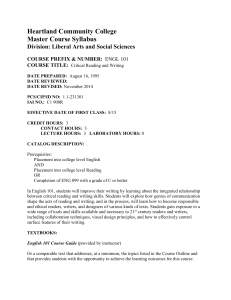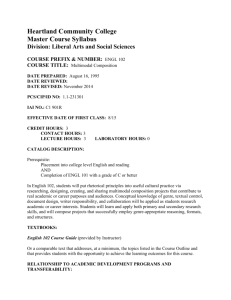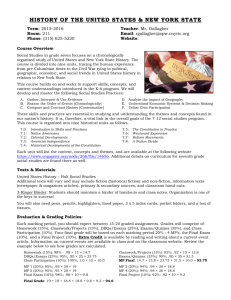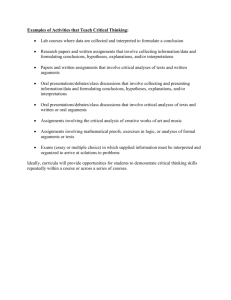english 2300 - rhetwritcult
advertisement
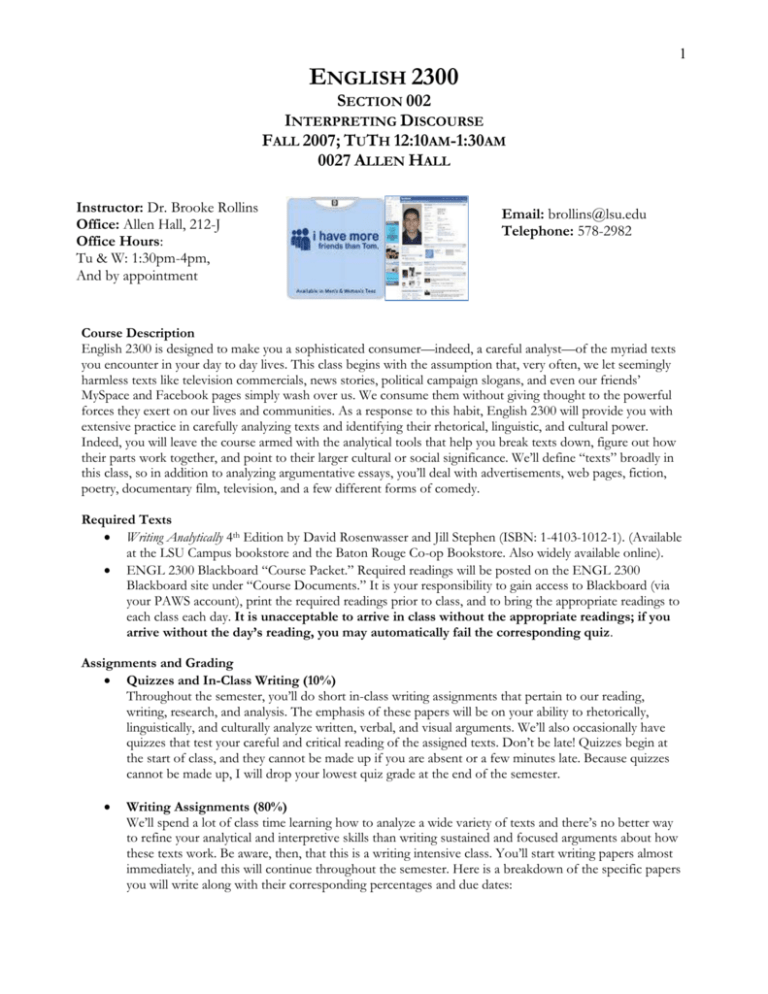
1 ENGLISH 2300 SECTION 002 INTERPRETING DISCOURSE FALL 2007; TUTH 12:10AM-1:30AM 0027 ALLEN HALL Instructor: Dr. Brooke Rollins Office: Allen Hall, 212-J Office Hours: Tu & W: 1:30pm-4pm, And by appointment Email: brollins@lsu.edu Telephone: 578-2982 Course Description English 2300 is designed to make you a sophisticated consumer—indeed, a careful analyst—of the myriad texts you encounter in your day to day lives. This class begins with the assumption that, very often, we let seemingly harmless texts like television commercials, news stories, political campaign slogans, and even our friends’ MySpace and Facebook pages simply wash over us. We consume them without giving thought to the powerful forces they exert on our lives and communities. As a response to this habit, English 2300 will provide you with extensive practice in carefully analyzing texts and identifying their rhetorical, linguistic, and cultural power. Indeed, you will leave the course armed with the analytical tools that help you break texts down, figure out how their parts work together, and point to their larger cultural or social significance. We’ll define “texts” broadly in this class, so in addition to analyzing argumentative essays, you’ll deal with advertisements, web pages, fiction, poetry, documentary film, television, and a few different forms of comedy. Required Texts Writing Analytically 4th Edition by David Rosenwasser and Jill Stephen (ISBN: 1-4103-1012-1). (Available at the LSU Campus bookstore and the Baton Rouge Co-op Bookstore. Also widely available online). ENGL 2300 Blackboard “Course Packet.” Required readings will be posted on the ENGL 2300 Blackboard site under “Course Documents.” It is your responsibility to gain access to Blackboard (via your PAWS account), print the required readings prior to class, and to bring the appropriate readings to each class each day. It is unacceptable to arrive in class without the appropriate readings; if you arrive without the day’s reading, you may automatically fail the corresponding quiz. Assignments and Grading Quizzes and In-Class Writing (10%) Throughout the semester, you’ll do short in-class writing assignments that pertain to our reading, writing, research, and analysis. The emphasis of these papers will be on your ability to rhetorically, linguistically, and culturally analyze written, verbal, and visual arguments. We’ll also occasionally have quizzes that test your careful and critical reading of the assigned texts. Don’t be late! Quizzes begin at the start of class, and they cannot be made up if you are absent or a few minutes late. Because quizzes cannot be made up, I will drop your lowest quiz grade at the end of the semester. Writing Assignments (80%) We’ll spend a lot of class time learning how to analyze a wide variety of texts and there’s no better way to refine your analytical and interpretive skills than writing sustained and focused arguments about how these texts work. Be aware, then, that this is a writing intensive class. You’ll start writing papers almost immediately, and this will continue throughout the semester. Here is a breakdown of the specific papers you will write along with their corresponding percentages and due dates: 2 a. b. c. d. e. f. Rhetorical Analysis 1: Rhetorical Analysis 2: Linguistic Analysis 1: Linguistic Analysis 2: Cultural Analysis 1: Cultural Analysis 2: 2-3 pages (10%) 4-5 pages (15%) 2-3 pages (10%) 4-5 pages (15%) 2-3 pages (10%) 6-8 pages (20%) Due 9/11 Due 10/2 Due 10/16 Due 10/30 Due 11/13 Due 12/6 (Research Required) Final (10%) During our final exam period (Wednesday, December 12, 12:30-2:30), you will take a final exam that asks you to bring your rhetorical, linguistic, and cultural analytic skills to bear on a text you haven’t seen in advance. Rules for Written Work Formatting: All work completed outside of class must be word-processed and double spaced using 12-point Times New Roman typeface (or a similar font) and 1-inch margins. Place the following information in the upper left-hand corner of the first page of each paper (no title pages, please): Your name = Art Vandalay Course, Section xx = English 2300, Section 2 The date = Oct. 18, 2007 Assignment Description = Rhetorical Analysis 2 Late work: All written assignments are due at the beginning of class. I will penalize late assignments one letter grade per day (including weekends) until the assignments are in my hands. Emailed assignments: You are responsible for handing in hard copies of your assignments. We’ll reserve emailed assignments for emergencies only. Attendance & Participation Come to class. You’ll learn more, your grades will be better, and the class as a whole will be more interesting and informative. If you miss a class, you are responsible for learning the material we cover by contacting a classmate who is willing to help catch you up. If you know ahead of time that you’re going to be absent, you should submit your assignments early. If you miss class when an assignment is due and I haven’t heard from you in advance, I will penalize your work for being late. Finally, if something unexpected occurs (such as an illness or a family emergency), you should contact me via email as soon as possible; I am a reasonable person, and I’ll be happy to work with you if you let me know (and, where appropriate, can document) when problems arise. Academic Honesty You are bound by the university’s policies on academic honesty, which bar you from presenting another person’s work or ideas as your own, allowing another person to write an assignment or part of an assignment for you, or failing to comply with rules for taking exams. If such a breach of academic honesty occurs, I will refer your case to the Office of the Dean of Students for resolution. Office Hours and Email I encourage you to visit me during my office hours. Please feel free to come by to say hello, to introduce yourself, to ask a question about the reading, or to discuss any element of the class in more detail. If you can’t drop by, I check my email regularly; so don’t hesitate to send me a message if you have questions or concerns about the class. Don’t be shy—I’m interested in talking with you about your work.

